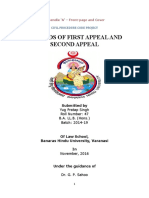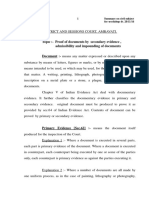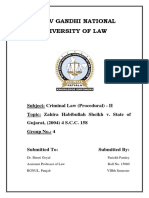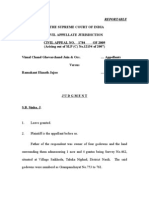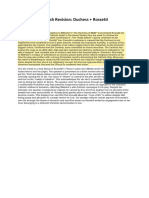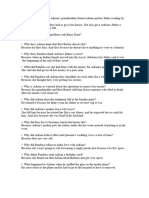Cross Examination
Cross Examination
Uploaded by
Ashwani AmanCopyright:
Available Formats
Cross Examination
Cross Examination
Uploaded by
Ashwani AmanCopyright
Available Formats
Share this document
Did you find this document useful?
Is this content inappropriate?
Copyright:
Available Formats
Cross Examination
Cross Examination
Uploaded by
Ashwani AmanCopyright:
Available Formats
March 5, 2013
RULE OF CROSS EXAMINATION
INTRODUCTION
In India where large number of complaints and cases are filed in civil and criminal courts every day, delay in justice is common as pendency of cases in courts are also growing rapidly. Examination of witnesses plays an important role in the presentation of the evidence in a court of law irrespective of civil or criminal case and admissibility of evidence is also an important aspect which has to be decided by the judges only. The testimony of a witness is recorded in the form of answer question. Witness is not permitted to deliver a speech to the Court, but is supposed only to answer the question. This way the testimony of the witness, can be confined to the facts relevant to the issue. Such process of recording the evidence is called his examination. The examination of a witness by the party who calls him shall be called his Examination-in-Chief. It must relate to relevant facts. No leading questions1 can be asked. The object of this examination is to get from the witness all material facts within his knowledge relating to the party's case. It is the duty of the counsel to bring out clearly and in proper chronological order every relevant fact in support of his client's case to which the witness can depose. The statements made in examination-in-chief lose much credibility and weight unless they are put into the crucible of cross-examination and emerge unscathed from the rest. Due to which each case will be looked upon clearly and it will take long time to pass the judgment by the court. The examination of witnesses can be classified into three types as defined under Sec: 137 of Indian Evidence Act, 1872 as follows:Examination-in-chief means the examination of witness by the party who calls him shall be called his examination-in-chief. Cross-Examination means the examination of witness by the adverse party shall be called his cross-examination.
Sec 141, Indian Evidence Act, 1872; Leading Questions- Any question suggesting the answer which the person putting it wishes or expects to receive is called a leading question.
1
Pooja Malhotra
1 R760210039
500012403
March 5, 2013
RULE OF CROSS EXAMINATION
Re-Examination means the examination of a witness, subsequent to the crossexamination by the party who called him, shall be called his re-examination. The order of examination is laid down under Sec 138. As per sec138, every witness shall be examined first by the party who has called him, then by the opposite party, and then, if the party who called, as per the partys desire
RIGHT OF CROSS-EXAMINATION
The right of Cross-Examination is one of the most powerful instrumentalities provided lawyers in the conduct of litigation. One of the most important purposes of Cross-Examination is to attempt to destroy the testimony or the credibility of the opponents witnesses. Justice is not served if a witness is unable to communicate credibility to a jury. The search for truth is the ultimate and idealistic end of all litigated matter in a court trial. In Jagdish Chand Pareek vs Mukesh Kumar Pareek2, decided on 13 February, 2013 the trial court had closed the right of the appellant-defendant to cross-examine the plaintiff. The appellant contested the following order was illegal and deserves to be set aside. As regards the denial of opportunity to crossexamine the plaintiff parties and taking into consideration the order-sheets, the court is of the opinion that the order for closing the right of the defendant to cross-examine the plaintiff was not proper. Further, in Sri Ashwatha Reddy vs Smt M Deveeramma3 on 6 February, 2013 the court appellant-defendant would also have a right of cross examining the plaintiff on this issue and in view of an opportunity having been granted to appellant- defendant also to lead evidence. Many time courts have compared the right to cross examination as a right under natural justice. Like in Shahid Balwa vs The Directorate Of Enforcement 4 on 24 January, 2013 the High Court of Delhi held that the respondents had completely compromised the petitioners right to cross-examine, which had resulted in breach of principles of natural justice. The provisions of
AIR 2013, Raj 282. Citation could not be found. Access from http://indiankanoon.org/doc/23749881/, Accessed on 3th,March, 2013. 4 Citation could not be found. Case accessed at http://indiankanoon.org/doc/42619944/, Accessed on 3th March, 2013.
2 3
Pooja Malhotra
2 R760210039
500012403
March 5, 2013
RULE OF CROSS EXAMINATION
Section 16 (1) of the FEMA, which mandate a grant of reasonable opportunity of being heard before imposing a penalty, encapsulated within it, the right to cross-examine any person on whose statement reliance is sought to be placed by the complainant.
CROSS EXAMINATION AS EVIDENCE
The art of Cross-Examination plays an important role in the trial of each case which involves hard work and talent of lawyers while providing justice to their clients. A perfect lawyer should learn the art of Cross-Examination not by reading newspapers but the successful artist learns by doing it, or watching others do it well; by reading trial and deposition transcripts or, better yet, by conducting the examination personally. The trial lawyer must learn as well to adapt to particular witnesses and different cases. The examination of a witness by the adverse party shall be called his cross-examination. The purpose of the cross-examination is to test the veracity of the witness. No evidence affecting a party is admissible against that party unless the latter has had an opportunity of testing its truthfulness by cross-examination5. The Supreme Court has pointed out that if the oral testimony of certain witness is contrary to proved facts, their might well be discarded on that ground. If their testimony is on face of it unacceptable, courts are bound to accept it merely was no cross examination. The purpose of cross examination is to expose the truth about the testimony of the witness. 6 The main object of Cross-Examination is to find out the truth and detection of falsehood in human testimony. It is designed either to destroy or weaken the force of evidence which is already given by a witness. Cross-Examination of witness is a duty of every lawyer towards his client and not a matter of glory and fame. It is the most efficacious test to discover the truth and to detect the false statements of the witness. It should be remembered that the Justice should not
Maganlal Vs. King Emperor AIR 1946 Nagpur 126 Juwar Singh v. State of M.P, AIR 1981 S.C 373. Cross- examination need not be confined to the facts stated by the witness in his examination-in-chief. It can extend to the whole range of relevant fact and also the fact exposing the credibility of the witness.
5 6
Pooja Malhotra
3 R760210039
500012403
March 5, 2013
RULE OF CROSS EXAMINATION
be defeated by the improper Cross-Examination. One of the purposes of Cross-Examination is to asking questions regarding what the witness has stated in the Examination-in-chief and the answer is the reply by the witness to the question put by the advocate. The object of cross-examination is to impeach the accuracy, credibility and general value of the evidence given in chief; to sift the facts already stated by the witness, to detect and expose discrepancies, or to elicit suppressed facts, which will support the case of the cross-examining party. Cross-examination, though a very powerful, is also a very dangerous engine. It is a double-edged weapon, and as often wounds him who wields it, as him at whom it is aimed. To wield it to advantage requires a great practice and natural tact. It should be keep in mind that the essence of cross-examination is, that it is the interrogation by the advocate of one party of a witness called by his adversary with the object either to obtain from such witness admissions favourable to his cause, or to discredit him. Cross-examination is the most effective of all means for extracting truth and exposing falsehood. But if the adverse party has had liberty to crossexamine and has not chosen to exercise it, the case is then the same in effect as if he had crossexamined. Often, however, one needs to spend time with the witness to develop several critical points to counter the impact of the direct examination. Before initiating a Cross-Examination of any witness, the lawyer should clearly bear in mind those points he or she wishes to make with that witness. And then, he or she should write them down. These points also should be discussed with those who are assisting at trial. Patience is the virtue in Cross-Examination and judges must give chance to every party to Cross-Examine the other partys witness. A lawyer should use leading questions i.e. is that correct? and isnt it a fact etc. at the time of Cross-Examining of the witness because asking only leading questions is perhaps the oldest rule of Cross-Examination. It is an old rule because it is a good one. Leading questions are most effective because they essentially allow the Cross-Examiner to testify and the witness to ratify. The technique advances one of the important dynamics of the courtroom is control. Asking leading questions allows the Cross-Examiner to be forceful, fearless, knowledgeable and informative. Good thing come from leading questions. Usually be aware that leading questions also can grow tiresome. No one likes to hear a hundred questions in a row that end with, is that
Pooja Malhotra
4 R760210039
500012403
March 5, 2013
RULE OF CROSS EXAMINATION
correct? and all the questions put during the trial of Cross-examination must be lawful as permitted under Sec: 146 of Indian Evidence Act, 1872. Questions asked during the Cross-Examination must be relevant to the issue related in the facts of the case and indecent & scandalous questions can also be asked by the advocate at the time of Cross-Examination unless they relate to the fact in issue. Most importantly questions intended to insult or annoy should be forbidden by the court though questions seems to be proper. The court who has authoritative power to decide the case can recall the witness for the CrossExamination based on the facts and circumstances of the particular case and a summary procedure does not take away the rights of the parties to Cross-Examine whereas every party has to be given fair deal in the matter of Cross-Examination. There are certain important points which can be considered as chief heads of the Cross-Examination as follows7:1. To cause the witness to alter or amend his evidence by questioning about his testimony. 2. To modify the evidence given under the Examination-in-chief, by causing the witness to speak to supplementary facts to show the reasons and circumstances. 3. To discredit the evidence of witness by putting questions connected with his character. 4. From reasons arising out of his evidence by causing him to give further evidence. 5. To cause him to give evidence to be received as true. In departmental proceedings the rules of evidence laid down in the Evidence Act are, strictly speaking, not applicable and the Inquiry Officer, the Presenting Officer and the charged public servant are not expected to act like judges or lawyers. The right of the Government servant to cross-examine a witness who has given evidence against him in a departmental proceeding is, however, a safeguard implicit in the reasonable opportunity to be given to him under Article 311 (2). The scope or mode of cross-examination in relation to the departmental enquiries have not been clearly set out anywhere. But there is no other variety of cross-examination except that envisaged under the Evidence Act. It follows, therefore, that the cross-examination in departmental
Md. Ibrahim Khan vs Susheel Kumar And Anr, AIR 1983 AP 69
Pooja Malhotra
5 R760210039
500012403
March 5, 2013
RULE OF CROSS EXAMINATION
enquiries should, as far as possible, conform to the accepted principles of cross-examination under the Evidence Act. Cross-examination of a witness is the most efficacious method of discovering the truth and exposing false-hood. During the examination-in-chief the witness may say things favourable to the party on whose behalf he tenders evidence and may deliberately conceal facts which may constitute part of the opponent's case. The art of cross-examination lies in interrogating witness in a manner which would bring out the concealed truth. Usually considerable latitude is allowed in cross-examination. i. It is not limited to matters upon which the witness has already been examined-in-chief, but may extend to the whole case. ii. The Inquiry Officer may not ordinarily interfere with the discretion of the cross-examiner in putting questions to the witness. However, a witness summoned merely to produce a document or a witness whose examination has been stopped by the Inquiry Officer before any material question has been put is not liable to cross-examination iii. It is also not permissible to put a question on the assumption that a fact was already proved. iv. A question about any matter which the witness had no opportunity to know or on which he is not competent to speak may be disallowed. v. The Inquiry Officer may also disallow question if the cross-examination is of inordinate length or oppressive or if a question is irrelevant.
vi.
It is the duty of the Inquiry Officer to see that the witness understands the question properly before giving an answer and of protecting him against any unfair treatment.
CASES WHERE WITNESS CANNOT BE CROSS-EXAMINED When witness not to be Cross Examined:
Pooja Malhotra
6 R760210039
500012403
March 5, 2013
RULE OF CROSS EXAMINATION
i.
A witness summoned merely to produce a document: In case of Shakuntala Jagdish Ghengat vs Municipal Corporation8, Jalgaon on 15 September, 2010 the court held that right to cross examine the said deponent of the affidavit dated, in view of the provisions of Section 139 of the Indian Evidence Act
ii. iii.
A witness sworn by mistake Where a person is presented by the assessee as his witness, he can only carry out examination -in-chief of his witness and does not get any vested right to cross examine his own witness.9
iv.
A witness whose examination has been stopped by the judge before any material question has been put is not liable to cross-examination;
v.
A witness giving replies in answer to questions by the Court can only be cross-examined as to credit;
vi. vii.
A witness, who has given no evidence in chief, may not be cross-examined as to credit; The Court may disallow cross-examination used simply to oppress and not for the purpose of justice;
viii.
Witnesses to character, though liable to be, are in fact rarely cross-examined.
RECOMMENDATIONS MADE BY LAW COMMISSION Law Commission in, 2000 in its 105th report reviewed the India Evidence Act and followed the modification in provisions regarding cross-examinations. Sec 53A to be added as Sec 146 is only confined to the question that might be put in cross-examination and limited operations. Section 53 A widens and bars such evidence to be adduced in any manner. In cases of sexual intercourse or attempt, it was made impermissible to adduce evidence or to put question in crossexamination of prosecutrix to her pertaining to genral immoral character, or previous sexual
experiences without any other person for proving such consent or quality of consent.
Citation could not be found. Accessed at http://indiankanoon.org/doc/173946/, Accessed on 3th March,2013 9 Awdhesh U.Mishra, Ankleshwar vs Assessee on 17 September, 2010 Accessed at http://indiankanoon.org/docfragment/26924365/?formInput=%22right%20to%20cross%20examine%22 %20sortby%3A%20mostrecent, Accessed on 3rd March, 2013.
8
Pooja Malhotra
7 R760210039
500012403
March 5, 2013
RULE OF CROSS EXAMINATION
Sec 146 (1) to be added to statutory expressly that in a prosecution for sexual assault. It shall not be permissible to adduce evidence or to put question in cross-examination of person assaulted with respect to his/her sexual history. Character or conduct whether to establish consent or otherwise. Testimony of child who has been subjected to sexual assault should be recorded at earlier opportunity by a judge/magistrate in the presence of a friend, relation or social worker whom the minor trusts. For implementation of the above suggestions, videotape/ CCTV should be provided. Further, where the child is to be taken for cross-examination, while recording the evidence of the minor, appropriate breaks should also be provided to make the minor feel comfortable. Leading Cases: Hari Narayan singh v/s State of West Bengal10: Ratio-Impeaching the credit of a Witness by Cross-Examining According to this case court observed that it is not necessary that all the persons who happen to be there should be brought as witnesses. One witness out of several is good enough, if his testimony legally acceptable and believable. Bhagwan Singh v/s State of Bihar11: Ratio-Cross-Examination of Hostile Witness In this case Supreme Court observed where the court gives permission to the prosecutor to Cross-Examine his own witness thus characterizing him as, hostile witness, that fact does not completely effaces his evidence. The evidence remains admissible in the trial and there is no legal bar to base a conviction upon his testimony if corroborated by other reliable evidence. Kartar Singh V. Thakur Singh12:
2009 CriLJ 4001 [cal.] AIR 1976 SC 202 12 AIR 2003 NOC 130 [P & H]; Ennen Casting P. Ltd v. M.M Sundresh, AIR 2003. Kant. 293, right of crossexamination allowed to be exercised by one co-respondent against the other when their interest are in direct conflict with each other.
10 11
Pooja Malhotra
8 R760210039
500012403
March 5, 2013
RULE OF CROSS EXAMINATION
An order allowing cross-examination of a co-defendant by another co-defendant to the extend of clash of intrest between them was held to be permissible.
Pooja Malhotra
9 R760210039
500012403
You might also like
- SEXXX - #5 - WattpadDocument1 pageSEXXX - #5 - WattpadChiara SaffarNo ratings yet
- Grounds of First and Second AppealDocument31 pagesGrounds of First and Second AppealSangeeta Singh67% (3)
- Doctrine of ProportionalityDocument9 pagesDoctrine of ProportionalityAshwani Aman100% (4)
- Summary of GE Healthcare's Quality Management System (QMS)Document8 pagesSummary of GE Healthcare's Quality Management System (QMS)AroonCheNo ratings yet
- 2014 Press Releases PDFDocument120 pages2014 Press Releases PDFPatrick Michael PerezNo ratings yet
- Cross-Examination & Principles of Cross-ExaminationDocument11 pagesCross-Examination & Principles of Cross-ExaminationshivendraNo ratings yet
- Cross Examination ProjectDocument8 pagesCross Examination ProjectSarthak GaurNo ratings yet
- Evidence ProjectDocument16 pagesEvidence Projectsana zamanNo ratings yet
- Accomplice EvidenceDocument22 pagesAccomplice EvidenceSiddharthSharmaNo ratings yet
- The Code of Criminal Procedure Project: Faculty of Law, Jamia Millia IslamiaDocument13 pagesThe Code of Criminal Procedure Project: Faculty of Law, Jamia Millia IslamiaANAM IQBAL100% (1)
- Evidence - Who Cannot Be Called As WitnessDocument15 pagesEvidence - Who Cannot Be Called As WitnessDeepanshu BhadauriaNo ratings yet
- Primary and Secondary EvidenceDocument22 pagesPrimary and Secondary EvidenceShalini YuvarajNo ratings yet
- Passing of The Ex Parte DecreeDocument6 pagesPassing of The Ex Parte DecreePadma Cheela100% (1)
- DR. RAM Manohar Lohiya National LAW University LucknowDocument18 pagesDR. RAM Manohar Lohiya National LAW University LucknowKushagra100% (1)
- Cross ExaminationDocument9 pagesCross ExaminationRakshit Gupta0% (1)
- Extra Judicial Confession - Law of Evidence FDDocument25 pagesExtra Judicial Confession - Law of Evidence FDABhishek KUmarNo ratings yet
- Assignment: Topic: - Summon in Civil SuitDocument12 pagesAssignment: Topic: - Summon in Civil SuitMohammad Ziya AnsariNo ratings yet
- Hostile WitnessesDocument7 pagesHostile Witnessesverma_libraNo ratings yet
- Anticipatory Bail in IndiaDocument16 pagesAnticipatory Bail in Indiagaurav.shukla36075% (4)
- A Project On Cross ExaminationDocument15 pagesA Project On Cross ExaminationVaishali Verma100% (2)
- IPC2 PPT (Group 7) Final S.349TO353Document26 pagesIPC2 PPT (Group 7) Final S.349TO353ShubhamSudhirSrivastavaNo ratings yet
- IPC TheftDocument27 pagesIPC TheftPratul VermaNo ratings yet
- Classification of Offences in CRPCDocument8 pagesClassification of Offences in CRPCZeesahnNo ratings yet
- Module 2.1Document28 pagesModule 2.1Tanisha sighal100% (1)
- Examination of WitnessesDocument13 pagesExamination of WitnessesSuchismita BaruaNo ratings yet
- CRPC ProjectDocument14 pagesCRPC ProjectjanveeNo ratings yet
- Injunction in CPCDocument16 pagesInjunction in CPCDeepanshu JharkhandeNo ratings yet
- National Law University Odisha: Transfer of Property ActDocument33 pagesNational Law University Odisha: Transfer of Property ActIshwar MeenaNo ratings yet
- Consequences of Registration of Sale Deed - Burden of Proof When It Is Alleged ShamDocument30 pagesConsequences of Registration of Sale Deed - Burden of Proof When It Is Alleged ShamSridhara babu. N - ಶ್ರೀಧರ ಬಾಬು. ಎನ್100% (1)
- Summons To Witness.Document2 pagesSummons To Witness.simran yadavNo ratings yet
- Enforcement of Certain Foreign AwardsDocument22 pagesEnforcement of Certain Foreign AwardsSiddharth SainNo ratings yet
- Assignment: Topic: - Examination of WitnessDocument12 pagesAssignment: Topic: - Examination of WitnessMohammad Ziya AnsariNo ratings yet
- CRPC - I (Online Examination) : Compoundable and Non-Compoundable OffencesDocument12 pagesCRPC - I (Online Examination) : Compoundable and Non-Compoundable OffencesUmair Ahmed AndrabiNo ratings yet
- Effect of Flaws in ConsentDocument24 pagesEffect of Flaws in Consentgowtham100% (1)
- CRPC - Chapter 10Document44 pagesCRPC - Chapter 10V.Vidhya Vasini100% (1)
- Note On Section 8 and Section 11 of Arbitration and Conciliation ActDocument18 pagesNote On Section 8 and Section 11 of Arbitration and Conciliation ActNiti KaushikNo ratings yet
- MAINTENANCE OF WIFE UNDER SECTION 125 OF CRPCDocument3 pagesMAINTENANCE OF WIFE UNDER SECTION 125 OF CRPCaryan jainNo ratings yet
- Damodaram Sanjivayya National Law University Visakhapatnam, A.P., IndiaDocument25 pagesDamodaram Sanjivayya National Law University Visakhapatnam, A.P., Indiashaik hidayathulla100% (1)
- National Law Institute University, Bhopal: Writ of Quo-WarrantoDocument19 pagesNational Law Institute University, Bhopal: Writ of Quo-WarrantosiddharthNo ratings yet
- Section 27 of Evidence ActDocument7 pagesSection 27 of Evidence ActAseem100% (1)
- Difference Between Summary and Regular Trial PDFDocument29 pagesDifference Between Summary and Regular Trial PDFmohit kumarNo ratings yet
- Law of Evidence AssignmentDocument16 pagesLaw of Evidence AssignmentAshwin PanickerNo ratings yet
- Contract Research Paper-Sem 3Document6 pagesContract Research Paper-Sem 3Priyanshi GandhiNo ratings yet
- Assignment On Critical Analysis of Written StatementDocument25 pagesAssignment On Critical Analysis of Written Statementdivya srivastavaNo ratings yet
- Cross ExaminationDocument6 pagesCross ExaminationpurviNo ratings yet
- Suit For Specific Performance To Sell Goods Agreed To Be SoldDocument2 pagesSuit For Specific Performance To Sell Goods Agreed To Be Soldkinnari bhutaNo ratings yet
- Final Draft - Pleading, Drafting and ConveyancingDocument6 pagesFinal Draft - Pleading, Drafting and ConveyancingMeghna SinghNo ratings yet
- Summary SuitsDocument16 pagesSummary SuitsSaurabh JainNo ratings yet
- Laws Relating To Inclusion and Exclusion of Parties in A Civil Suit: A Comparative Analysis of Indian and Federal Procedural LawsDocument14 pagesLaws Relating To Inclusion and Exclusion of Parties in A Civil Suit: A Comparative Analysis of Indian and Federal Procedural LawsNehmat SethiNo ratings yet
- Plaint - Recovery of PossesionDocument5 pagesPlaint - Recovery of PossesionnoyonNo ratings yet
- Parties To SuitDocument18 pagesParties To SuitRenuNo ratings yet
- Part Performance PDFDocument9 pagesPart Performance PDFManas DawarNo ratings yet
- Assignment On Contract Law 1Document17 pagesAssignment On Contract Law 1Aashi watsNo ratings yet
- Pleadings CPC NotesDocument6 pagesPleadings CPC NotesIyalpari63% (8)
- Drafting, Pleadings & Appearances in Civil Procedure CodeDocument14 pagesDrafting, Pleadings & Appearances in Civil Procedure CodeSANTHOSH KUMAR T MNo ratings yet
- Retracted ConfessionDocument11 pagesRetracted ConfessionMohd Yasin100% (1)
- Code of Civil Procedure Ii: Project ReportDocument27 pagesCode of Civil Procedure Ii: Project ReportKarman AulakhNo ratings yet
- Sessions Judge Cannot Directly Take Cognizance Committal Proceedings Necessary Except in 309 CRPCDocument18 pagesSessions Judge Cannot Directly Take Cognizance Committal Proceedings Necessary Except in 309 CRPCSridhara babu. N - ಶ್ರೀಧರ ಬಾಬು. ಎನ್No ratings yet
- El Proj - Burden of ProofDocument30 pagesEl Proj - Burden of ProofRamanDhimanNo ratings yet
- Expert Opinion Under Indian Evidence Act by Akshay BawejaDocument8 pagesExpert Opinion Under Indian Evidence Act by Akshay BawejaShashank SumanNo ratings yet
- DPCDocument14 pagesDPCPulkit PareekNo ratings yet
- Unit-Iv: Enforcement of Certain Foreign Awards: New York Convention Awards (SEC 44-52) SEC 44 Definition.Document12 pagesUnit-Iv: Enforcement of Certain Foreign Awards: New York Convention Awards (SEC 44-52) SEC 44 Definition.Prabhsiman SinghNo ratings yet
- Finalisee Cross ExaminationDocument8 pagesFinalisee Cross Examinationgeetika singhNo ratings yet
- Cross ExaminationDocument11 pagesCross ExaminationVarun MittalNo ratings yet
- Adequacy of Environmental Legal Framework in Indian TourismDocument12 pagesAdequacy of Environmental Legal Framework in Indian TourismAshwani AmanNo ratings yet
- Political Science ProjectDocument15 pagesPolitical Science ProjectAshwani AmanNo ratings yet
- Project On "Legal Education": University of Petroleum and Energy StudiesDocument1 pageProject On "Legal Education": University of Petroleum and Energy StudiesAshwani AmanNo ratings yet
- University of Petroleum and Energy Studies: Project OnDocument31 pagesUniversity of Petroleum and Energy Studies: Project OnAshwani AmanNo ratings yet
- Negotiation, Mediation, and ArbitrationDocument2 pagesNegotiation, Mediation, and ArbitrationLusine HarutyunyanNo ratings yet
- Learning Module: A. Ethical Issues in Employer-Worker Relations Learning ObjectivesDocument19 pagesLearning Module: A. Ethical Issues in Employer-Worker Relations Learning ObjectivesQueenieCatubagDomingo100% (1)
- Tutorial 5 AnsDocument2 pagesTutorial 5 AnsJoey Lok EejoNo ratings yet
- ADF Architects Datafile (2012-12) PDFDocument68 pagesADF Architects Datafile (2012-12) PDFCésar VasconcellosNo ratings yet
- WASC Procedures On Probationary VisitsDocument5 pagesWASC Procedures On Probationary VisitsBayAreaNewsGroupNo ratings yet
- Prizes and BursariesDocument3 pagesPrizes and Bursariesjayanthi89No ratings yet
- Duchess + Rossetti RevisionDocument1 pageDuchess + Rossetti RevisionJamie WalkerNo ratings yet
- El CidDocument5 pagesEl CidMoriancumer A. CabasagNo ratings yet
- Gainer 1993Document15 pagesGainer 1993Kaoutar KANo ratings yet
- ROG-HSE-PLC-003, Access and Egress PolicyDocument1 pageROG-HSE-PLC-003, Access and Egress PolicyvladNo ratings yet
- WSH Alert Accident Advisory, 26july 2018 Worker Fell Through Floor GratingDocument3 pagesWSH Alert Accident Advisory, 26july 2018 Worker Fell Through Floor GratingvengielactaotaoNo ratings yet
- Ijazah S1 - UPPB - Irma RahmawatiDocument1 pageIjazah S1 - UPPB - Irma RahmawatiIrma RahmawatiNo ratings yet
- Socio AnthroselfDocument35 pagesSocio AnthroselfFant AsticNo ratings yet
- 11 Geography Eng SM 2024Document320 pages11 Geography Eng SM 2024ml627707No ratings yet
- Complete The Sentences With The Correct Form of Be Going ToDocument2 pagesComplete The Sentences With The Correct Form of Be Going Torafael rodriguez romoNo ratings yet
- El Diario Secreto de Adrian MoleDocument2 pagesEl Diario Secreto de Adrian Molenacholj85No ratings yet
- Daily Technical Report: Sensex (16913) / NIFTY (5114)Document4 pagesDaily Technical Report: Sensex (16913) / NIFTY (5114)Angel BrokingNo ratings yet
- Explorations in Sri Lankan Archaeology With Raj Somadeva PART PDFDocument9 pagesExplorations in Sri Lankan Archaeology With Raj Somadeva PART PDFdarshanieratnawalliNo ratings yet
- 3EXPLRc Flee FornicationDocument6 pages3EXPLRc Flee FornicationestherrosettaNo ratings yet
- Liability Insurance.Document62 pagesLiability Insurance.pankajgupta80% (5)
- Rainwater Harvesting and Watershed ManagementDocument27 pagesRainwater Harvesting and Watershed ManagementNavdeep sharmaNo ratings yet
- Pakistan Austrian Institute of Tourism and Hotel ManagementDocument2 pagesPakistan Austrian Institute of Tourism and Hotel ManagementTourismcorporation KhyberpakhtunkhwaNo ratings yet
- Ranabir Samaddar - From Popular Movements To Rebellion - The Naxalite Decade-Routledge - Taylor & Francis Group (2019)Document593 pagesRanabir Samaddar - From Popular Movements To Rebellion - The Naxalite Decade-Routledge - Taylor & Francis Group (2019)JOSÉ MANUEL MEJÍA VILLENANo ratings yet
- Bharti Axa Life InsuranceDocument81 pagesBharti Axa Life InsuranceJitin Bhutani100% (1)
- Brazil Bamboo Investment Pitch Deck - AAVA ClimateDocument21 pagesBrazil Bamboo Investment Pitch Deck - AAVA ClimateGuilherme KorteNo ratings yet
- Indian Independence and Partition PPT (Autosaved)Document31 pagesIndian Independence and Partition PPT (Autosaved)MISTER AJAXNo ratings yet
- Rock Excavation 0110Document8 pagesRock Excavation 0110Agus WinarnoNo ratings yet

